Building Safer Workplaces on the Central Coast: Why You Need a Workplace Safety Consultant in Bateau Bay
Creating compliance, confidence, and a culture of care across every industry
Workplace safety is more than a legal obligation, it is the cornerstone of sustainable business operations. Whether you’re managing a construction site, running a hospitality venue, or operating a small business, safety systems protect your most valuable asset: your people.
On the Central Coast, where industries such as construction, healthcare, logistics and retail thrive, maintaining compliance with Work Health and Safety (WHS) legislation can be complex. The rules are detailed, the risks are real, and the consequences of getting it wrong can be severe. That’s why engaging a workplace safety consultant in Bateau Bay is not just beneficial, it’s essential.
Safety consultants bring expertise, structure, and peace of mind to employers who want to ensure their workplaces meet legal requirements while fostering a genuine culture of care. This article explores what workplace safety consulting involves, why it’s crucial for modern businesses, and how local expertise in Bateau Bay can help organisations reduce risk, improve productivity, and build stronger teams.
Understanding Workplace Safety
Workplace safety, also known as Work Health and Safety (WHS) or Occupational Health and Safety (OHS) encompasses the systems, policies, and behaviours that prevent injury and illness at work. It’s not limited to physical hazards such as machinery, heights, or chemicals; it also includes psychosocial risks such as fatigue, stress, and bullying.
In Australia, workplace safety is governed by the Work Health and Safety Act 2011 (NSW) and associated regulations. These laws require every Person Conducting a Business or Undertaking (PCBU) to ensure, so far as is reasonably practicable, the health and safety of workers and others affected by their operations.
This obligation includes:

Non-compliance can result in heavy fines, legal action, and even imprisonment. But beyond legal risks, poor safety performance damages morale, reputation, and profitability.
That’s why the expertise of a workplace safety consultant in Bateau Bay can make such a significant difference, translating legal obligations into practical, proactive systems that work.
What Does a Workplace Safety Consultant Do?
A workplace safety consultant is a specialist who advises organisations on how to manage health and safety risks effectively. Their work combines legal knowledge, technical skill, and human understanding to create safe, compliant, and productive workplaces.
Key Responsibilities Include:

- WHS Audits and Gap Analysis
Consultants assess current systems, policies, and workplace conditions to identify compliance gaps and improvement opportunities.
- Risk Assessment and Control
They identify hazards, evaluate risks, and recommend control measures aligned with the “hierarchy of controls.”
- Safety Management System Development
Consultants design tailored WHS Management Systems (WHSMS) aligned with ISO 45001 and SafeWork NSW expectations.
- Policy and Procedure Writing
They prepare customised safety documentation such as Safe Work Method Statements (SWMS), Risk Registers, and Emergency Response Plans.
- Incident Investigation
When accidents or near-misses occur, consultants investigate root causes and help implement corrective actions.
- Training and Induction
Consultants deliver practical safety training to workers, supervisors, and management to ensure everyone understands their roles and responsibilities.
- Contractor Management
They help businesses prequalify contractors and ensure their safety standards align with site requirements.
- Safety Culture and Leadership Development
Beyond compliance, consultants coach organisations to build positive safety cultures where employees take ownership of their wellbeing.
- Emergency Planning and Response
Consultants design emergency management frameworks, from fire evacuation plans to first aid and spill response.
- Continuous Improvement
Safety systems evolve alongside technology, workforce, and regulatory change. Consultants provide ongoing support to keep businesses up to date.
Why Bateau Bay Businesses Need Safety Expertise
1. Diverse Local Industries
Bateau Bay and the wider Central Coast host a mix of businesses, construction, aged care, manufacturing, retail, and hospitality. Each presents unique safety risks that require industry-specific knowledge.
For example:
- Construction sites must manage high-risk work such as working at heights and electrical safety.
- Aged care facilities must protect both workers and residents from manual handling injuries and infection risks.
- Retail and hospitality businesses face slip, trip, and ergonomic hazards daily.
2. Regulatory Complexity
NSW WHS legislation includes dozens of codes of practice, from hazardous chemicals to psychosocial hazards. Keeping up with these evolving rules is challenging without professional support.
3. Workforce Growth and Contractor Use
As local businesses expand, many rely on contractors or casual staff. Ensuring every worker, whether employee or subcontractor, understands and follows safe procedures is critical.
4. Insurance and Liability
A documented, active WHS Management System reduces insurance premiums and provides legal protection in the event of a claim.
5. Community Reputation
In regional communities like Bateau Bay, reputation matters. Demonstrating strong safety standards builds trust with clients, employees, and regulators.
By engaging a workplace safety consultant in Bateau Bay, local businesses can navigate these challenges confidently and efficiently.
The Legal Framework for Workplace Safety
The Work Health and Safety Act 2011 (NSW) sets out general duties for PCBUs, officers, and workers. Complementary regulations and codes of practice provide detailed guidance on topics such as:
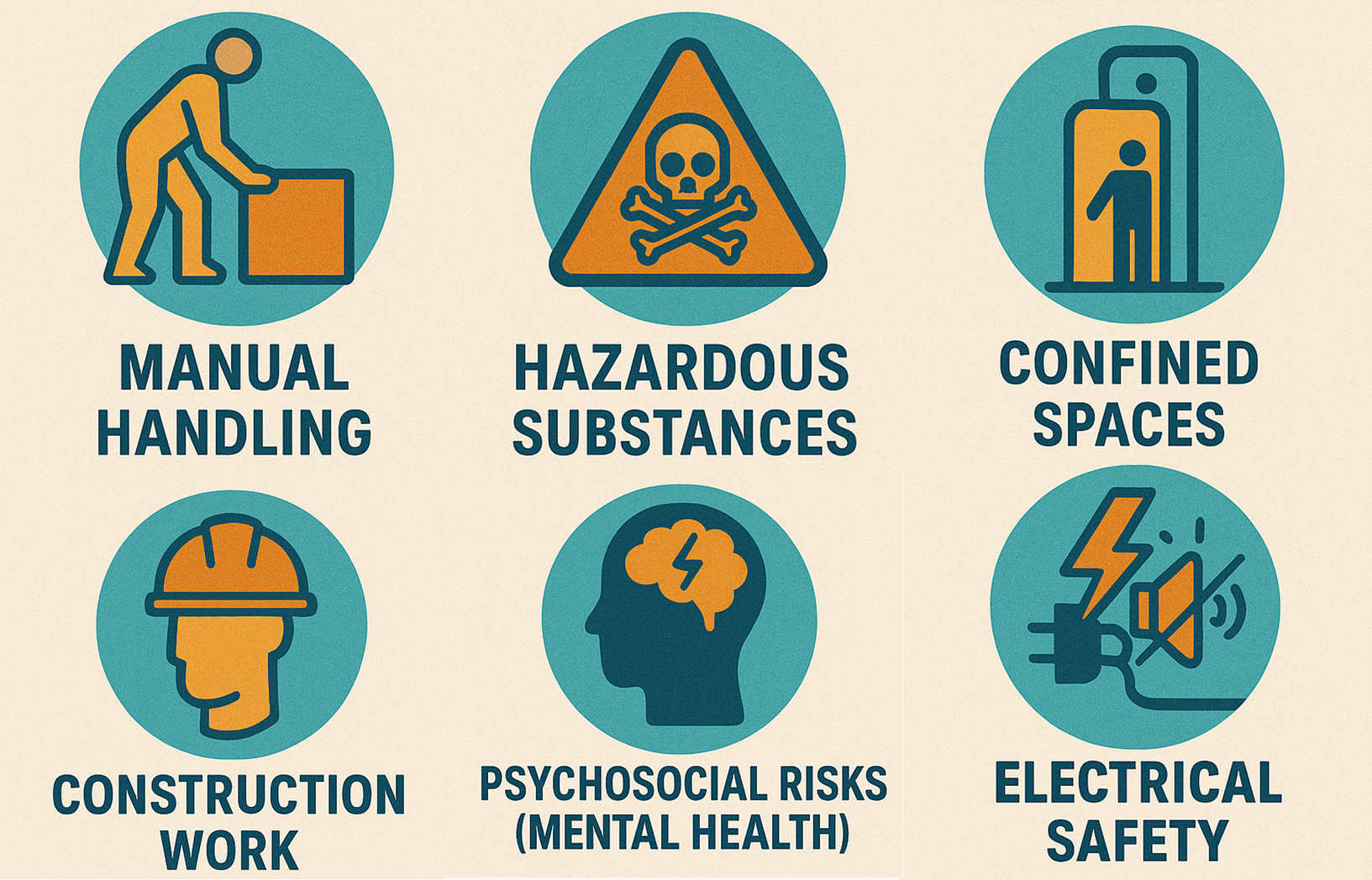
WorkSafe NSW enforces these laws through inspections, notices, and prosecutions. The penalties for breaches are severe:
- Up to $3 million for corporations.
- Up to $600,000 for individuals conducting businesses.
- Up to $300,000 and/or 5 years’ imprisonment for workers found recklessly endangering others.
Comprehensive WHS policies, supported by regular audits and training, demonstrate due diligence and reduce exposure to these penalties.
A professional consultant ensures your systems are compliant, well-documented, and up to date providing assurance that you’re doing everything reasonably practicable to keep people safe.
The Process: How Consultants Work with Businesses
While every project is unique, most safety engagements follow a structured process to deliver measurable results.
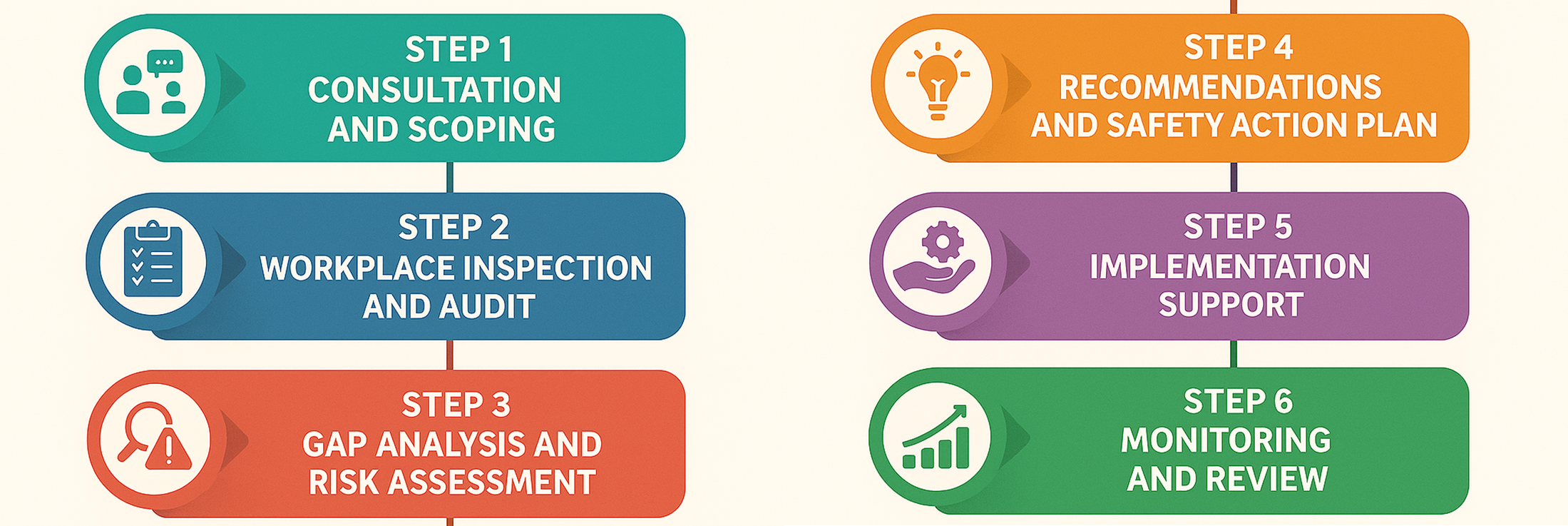
Step 1: Consultation and Scoping
The consultant meets with business leaders to understand operations, workforce size, and key risks.
Step 2: Workplace Inspection and Audit
They conduct on-site assessments, reviewing safety documentation, physical conditions, and worker practices.
Step 3: Gap Analysis and Risk Assessment
Findings are compared against legislative requirements and best-practice standards.
Step 4: Recommendations and Safety Action Plan
The consultant prepares a detailed report outlining priorities, timeframes, and responsible persons.
Step 5: Implementation Support
They assist in developing new policies, training staff, and integrating safety into everyday operations.
Step 6: Monitoring and Review
Periodic audits and performance reviews ensure continued compliance and continuous improvement.
This collaborative process ensures that safety systems are not only compliant but also practical and sustainable.
The Benefits of Professional Safety Consulting
Engaging a professional safety consultant offers tangible benefits across every level of the business:

- Legal Compliance – Stay aligned with WHS Act and Codes of Practice, avoiding costly fines or shutdowns.
- Reduced Incidents and Injuries – A proactive approach prevents accidents before they occur.
- Improved Productivity – Safe workers are confident, focused, and efficient.
- Lower Insurance Costs – Demonstrating robust WHS systems can reduce premiums.
- Stronger Reputation – Clients and communities respect businesses that prioritise safety.
- Employee Retention – Workers are more loyal to employers who value their wellbeing.
- Audit Readiness – Consultants ensure you are always prepared for regulatory or client audits.
The return on investment in safety consulting is clear: fewer accidents, lower costs, and better business outcomes.
Case Study: Construction Site Compliance in Bateau Bay
A local residential construction company in Bateau Bay was struggling with inconsistent WHS documentation and frequent site safety concerns. The business engaged a consultant to overhaul its safety management.
Consultant Actions:
- Conducted a full WHS audit across three active job sites.
- Identified gaps in induction procedures and SWMS documentation.
- Developed a new WHS Management Plan, Risk Register, and emergency response framework.
- Trained supervisors in hazard reporting and incident investigation.
- Introduced a cloud-based safety reporting tool for workers.
Results Within 6 Months:
- Incident rates dropped by 45%.
- The company passed its next WorkSafe NSW inspection with no improvement notices.
- Site supervisors reported stronger communication and accountability.
This real-world example demonstrates how expert intervention from a workplace safety consultant in Bateau Bay can turn compliance challenges into opportunities for improvement.
The Role of Technology in Modern Safety Management
The digital era has transformed how safety is managed and monitored.
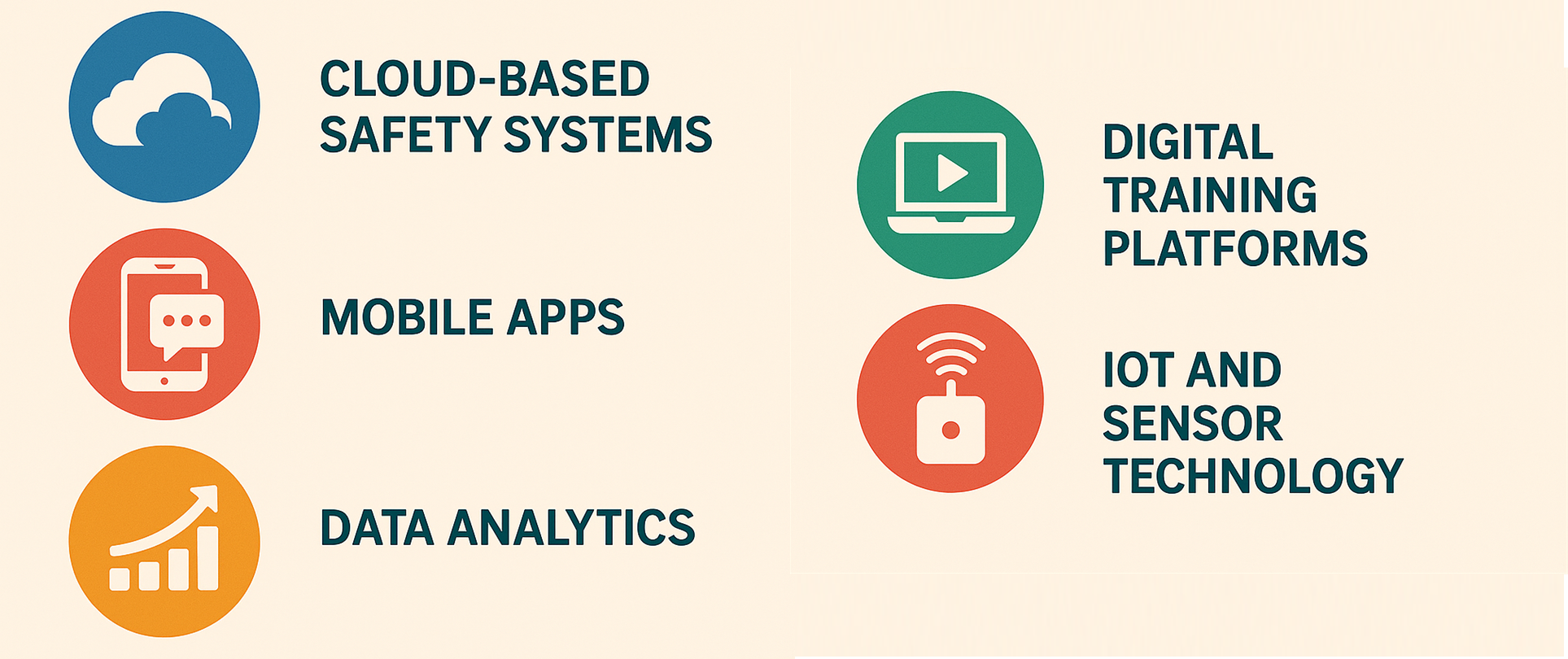
Consultants now help organisations implement innovative tools that streamline WHS processes:
- Cloud-Based Safety Systems – Centralise incident reporting, risk registers, and audits.
- Mobile Apps – Allow workers to conduct inspections, log hazards, and access procedures on the go.
- Data Analytics – Identify trends and predict high-risk areas before incidents occur.
- Digital Training Platforms – Deliver online induction and refresher courses for all workers.
- IoT and Sensor Technology – Monitor noise, temperature, or gas levels in real time.
Consultants ensure these technologies integrate smoothly into existing systems while maintaining compliance with privacy and data standards.
Building a Positive Safety Culture
True safety success depends on more than policies, it’s about culture. Consultants play a critical role in developing positive safety cultures where everyone takes ownership.
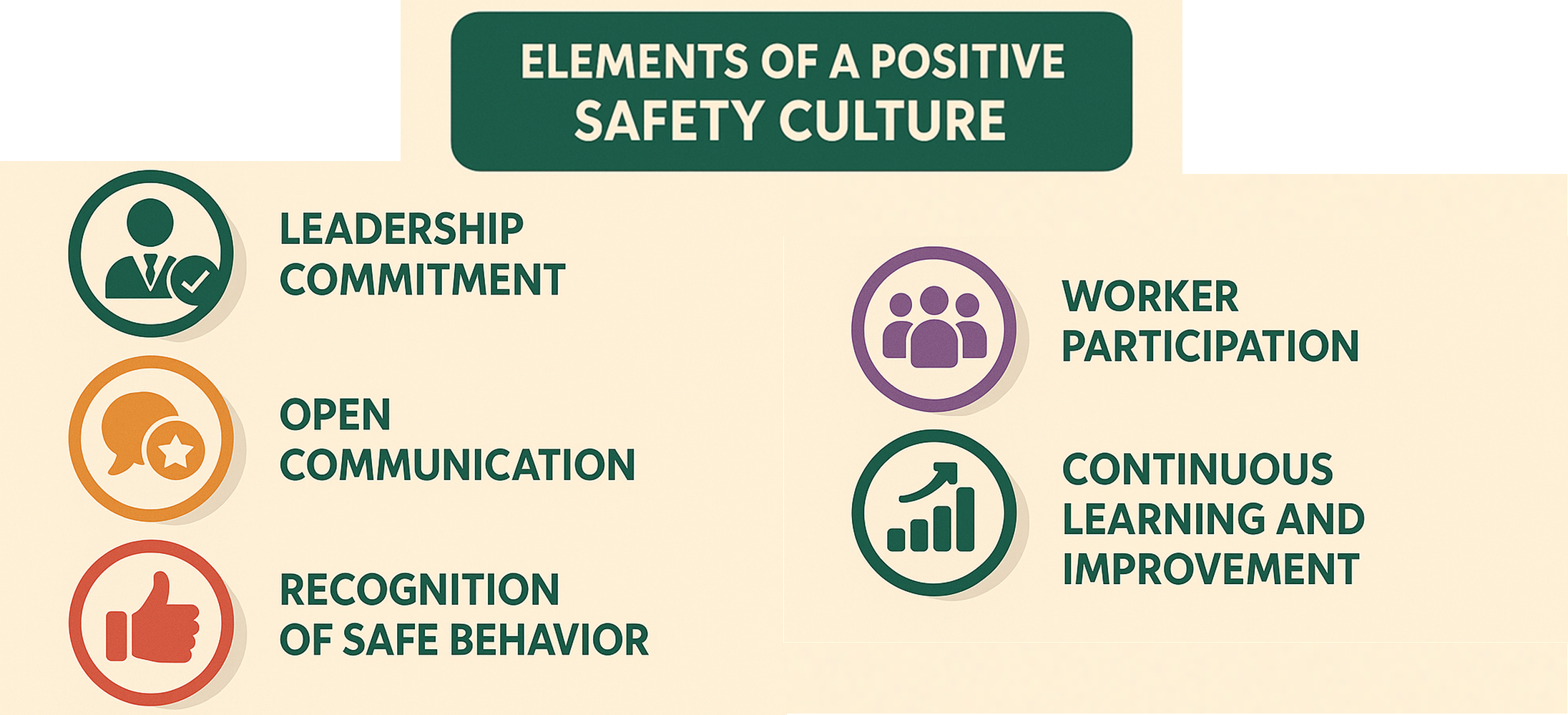
Consultants help organisations achieve this through leadership training, team workshops, and targeted safety campaigns.
Common Workplace Hazards in the Central Coast Region
While every industry faces unique risks, several hazards are common across Bateau Bay and the Central Coast:
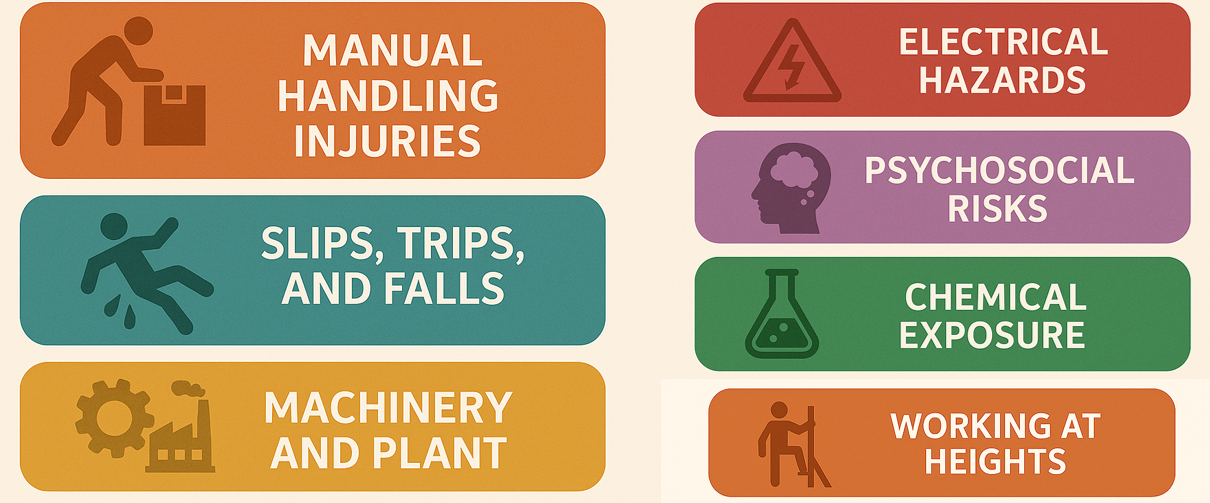
- Manual Handling Injuries: Lifting, pushing, or repetitive tasks.
- Slips, Trips, and Falls: Uneven surfaces, poor housekeeping, or wet floors.
- Machinery and Plant: Crushing, entanglement, or mechanical failure.
- Electrical Hazards: Faulty equipment or poor isolation practices.
- Psychosocial Risks: Stress, fatigue, harassment, or isolation.
- Chemical Exposure: Cleaning agents, fuels, or hazardous substances.
- Working at Heights: Scaffolds, ladders, or roof access.
A qualified consultant assesses these risks systematically, applying proven control measures such as engineering solutions, procedural changes, and training.
Training and Education: Empowering Workers
Effective safety management relies on knowledgeable, engaged workers. Consultants design and deliver training programs that are relevant, engaging, and compliant.
Common Training Topics Include:
- WHS Induction and Awareness.
- Manual Handling and Ergonomics.
- Incident Reporting and Investigation.
- Risk Assessment and Hazard Identification.
- Working at Heights.
- Confined Space Entry.
- Fire Safety and Emergency Response.
- Psychosocial Hazard Management.
Training not only improves compliance but also builds confidence and competence across the workforce.
Continuous Improvement Through Auditing
Safety systems must evolve with your organisation. Consultants conduct regular audits to measure effectiveness and identify opportunities for improvement.
Audit outcomes typically include:
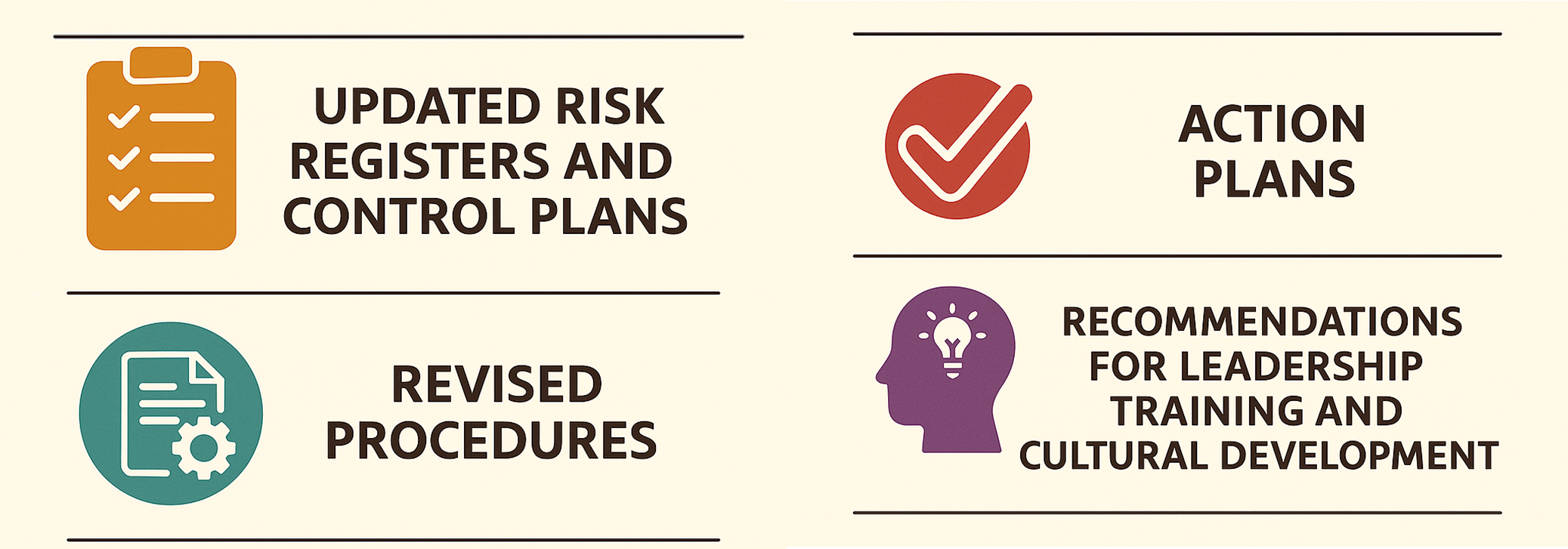
Auditing keeps safety dynamic, ensuring your systems remain current and effective year after year.
The Cost of Ignoring Safety
Some businesses view safety as a cost rather than an investment, a mindset that can prove disastrous.
Ignoring safety leads to:
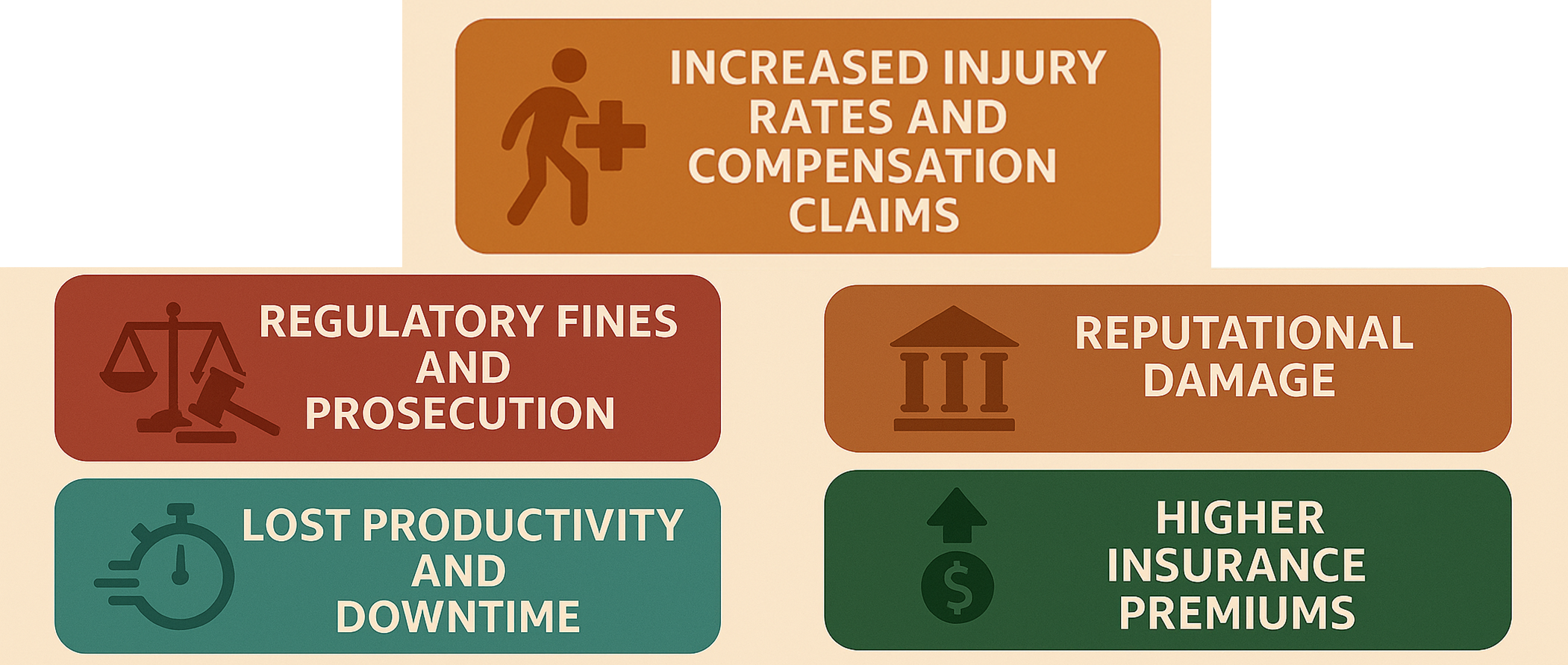
Conversely, investing in professional safety management delivers measurable savings, through reduced incidents and improved operational performance.
How to Choose the Right Consultant
When selecting a workplace safety consultant, look for:
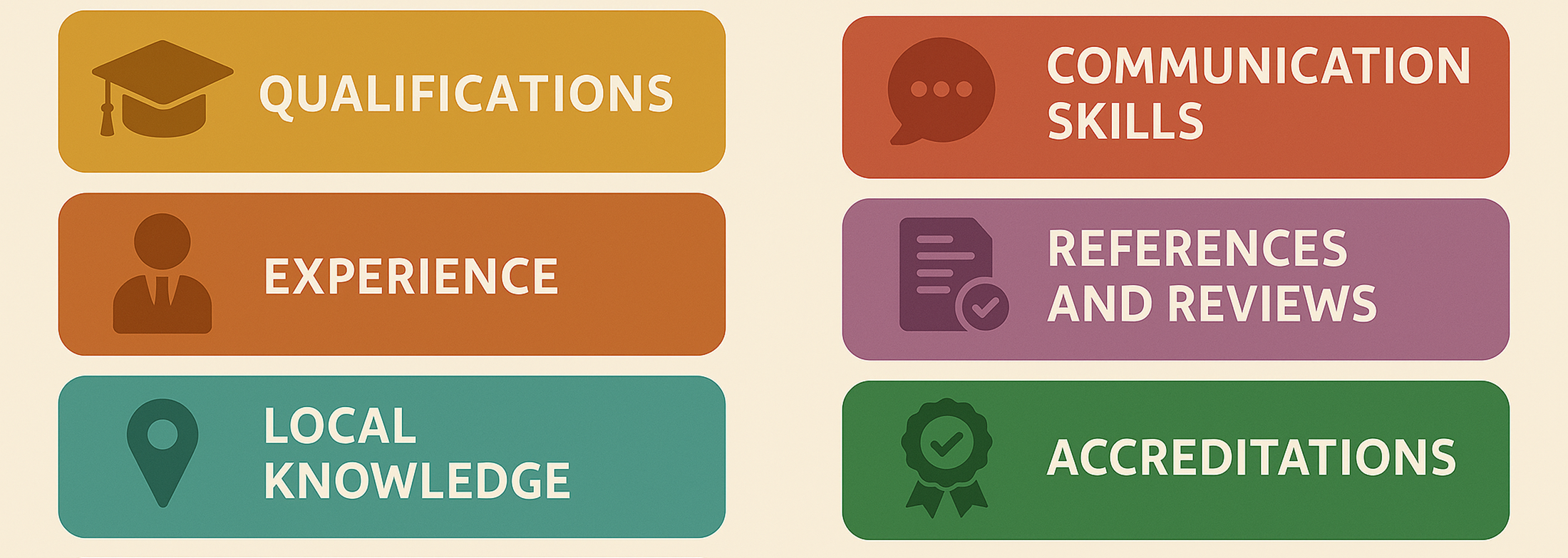
- Qualifications: Certifications in occupational health and safety (e.g., Diploma or Graduate Diploma WHS).
- Experience: Proven history across multiple industries.
- Local Knowledge: Understanding of Central Coast business environments and regulators.
- Communication Skills: Ability to engage workers and simplify complex regulations.
- References and Reviews: Check client feedback or case studies.
- Accreditations: Membership with the Australian Institute of Health & Safety (AIHS) or equivalent body.
The right consultant will act as a partner, not just an auditor, helping you embed safety as part of your organisation’s DNA.
Future Trends in Workplace Safety
Safety is an ever-evolving field. Emerging trends include:

- Focus on Mental Health: Managing psychosocial risks under new WHS Regulations.
- Automation and AI: Using technology to predict hazards and analyse safety data.
- Sustainability Integration: Aligning safety with environmental and social governance (ESG) goals.
- Remote and Hybrid Work: Adapting WHS systems to new work environments.
- Inclusive Safety Leadership: Promoting diverse voices in safety decision-making.
Consultants who stay ahead of these trends ensure their clients remain compliant, competitive, and compassionate.
Conclusion
Workplace safety is not just about compliance, it’s about people, productivity, and pride in your business. Whether you’re a construction firm, healthcare provider, or retail store, ensuring everyone returns home safely each day is the ultimate measure of success.
Engaging a professional workplace safety consultant in Bateau Bay provides the knowledge, systems, and confidence you need to manage risks effectively. From audits and training to policy development and culture building, consultants transform safety from a legal requirement into a lasting advantage.
For Bateau Bay businesses, the message is clear: invest in safety now to protect your future. By taking proactive steps, you not only comply with the law but also create a workplace where people feel valued, respected, and secure, the true foundation of any thriving organisation.
Related Content
Join Our Newsletter
Receive expert insights, safety updates, and the latest updates in our services and apps. Stay ahead of workplace safety, compliance, and operational efficiency delivered straight to your inbox.

.png)
.png)
.png)
.png)
.png)
.png)
.png)
.png)
.png)
.png)